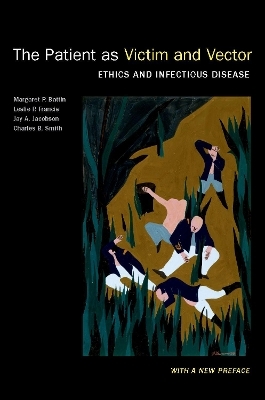
The Patient as Victim and Vector, New Edition
Oxford University Press Inc (Verlag)
978-0-19-756454-7 (ISBN)
Against a background of methods from the long human history of contagious infectious disease-quarantine, isolation, cordon sanitaire, surveillance and contact tracing, testing by both archaic and modern methods, lockdown, and immunization-the victim-and-vector view spotlights ethical challenges for clinical medicine, research, public health, and health policy. These insights are probed in the new Preface on COVID-19 and are essential in our continuing struggle to address not only the current coronavirus pandemic, but the next, and the next after that.
Margaret P. Battin, MFA, PhD, is Distinguished Professor of Philosophy and Adjunct Professor of Internal Medicine in the Program in Medical Ethics and Humanities at the University of Utah. The author of prize-winning short stories, she has authored, edited, or co-edited some twenty academic books, including The Least Worst Death. She has been named one of the "Mothers of Bioethics." Leslie P. Francis, PhD, JD, is Distinguished Professor of Philosophy and Distinguished Alfred C. Emery Professor of Law at the University of Utah. She writes on privacy, reproductive ethics, data use in public health, disability law, and federalism, and provides pro bono legal representation to people who are subjected to guardianship proceedings. Her books include Privacy: What Everyone Needs to Know. Jay A. Jacobson, MD, is Emeritus Professor, Division of Infectious Disease and founder of the Division of Medical Ethics and Humanities at the University of Utah School of Medicine. He is a Master of the American College of Physicians and Fellow, Infectious Diseases Society of America. He is a recipient of the American Medical Association Award for Leadership in Medical Ethics and Professionalism. Charles B. Smith, MD, is Emeritus Professor of Medicine at the University of Utah School of Medicine and previous Chief of the Division of Infectious Diseases. He has been Associate Dean at the University of Washington School of Medicine and Chief Medical Officer at the Seattle Veterans Administration Hospital. He has served as President of the Veterans Administration Association of Chiefs of Staff and is co-editor of Ethics and Infectious Disease.
Preface: Victims, Vectors, and the COVID-19 Pandemic
Part I: Seeing Infectious Disease as Central
1. Seeing Infectious Disease as Central
2. The Biological Basics of Infectious Disease
3. Characteristics of Infectious Disease that Raise Distinctive Challenges for Bioethics
4. How Infectious Disease Got Left Out of Bioethics
5. Closing the Book on Infectious Disease: The Mischievous Consequences for Public Health
Part II: Theoretical Considerations
6. Embedded Autonomy and the "Way-Station Self"
7. Thinking about Infectious Disease: The Multiple Perspectives of the PVV View
Part III: Dilemmas Old and New: Health Care Dilemmas Through the Lens of Infectious Disease
8. Old Wine in New Bottles: Traditional Issues in Bioethics from the Victim/Vector Perspective
9. From the Magic Mountain to a Dying Homeless Man and His Dog: Imposing Isolation and Treatment in Tuberculosis Care
10. The Ethics of Research in Infectious Disease: Experimenting on This Patient, Risking Harm to That One
11. Vertically-Transmitted Infection: Are the Medical and Public Health Responses Consistent?
12. Should Rapid Tests for HIV Infection Now Be "Mandatory" During Pregnancy or in Labor?
13. Antimicrobial Resistance
14. Immunization and the HPV Vaccine
Part IV: Constraints and the Question of What We Owe Each Other As Victims and Vectors
15. A Thought Experiment: Rapid Testing for Infectious Disease in Airports and Places of Public Contact
16. Constraints in the Control of Infectious Disease
17. Pandemic Planning: What is Ethically Justified?
18. Compensation and the Victims of Constraint
19. Pandemic Planning and the Justice of Health Care Distribution
Part V: Making Use of the PVV View
20. Thinking Bi: Emerging Global Efforts for the Control of Infectious Disease
21. "The Patient as Victim and Vector" Approach as a Critical and Diagnostic Tool for Philosophical Ethics and Public Policy
References.
| Erscheinungsdatum | 26.03.2021 |
|---|---|
| Verlagsort | New York |
| Sprache | englisch |
| Maße | 234 x 155 mm |
| Gewicht | 857 g |
| Themenwelt | Medizin / Pharmazie ► Medizinische Fachgebiete ► Medizinethik |
| Studium ► Querschnittsbereiche ► Geschichte / Ethik der Medizin | |
| Studium ► Querschnittsbereiche ► Infektiologie / Immunologie | |
| Studium ► Querschnittsbereiche ► Prävention / Gesundheitsförderung | |
| ISBN-10 | 0-19-756454-2 / 0197564542 |
| ISBN-13 | 978-0-19-756454-7 / 9780197564547 |
| Zustand | Neuware |
| Haben Sie eine Frage zum Produkt? |
aus dem Bereich


